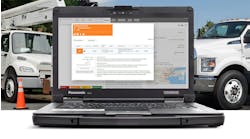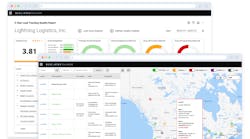As the December 18 date for the imposition of the electronic logging device (ELD) mandate draws closer, efforts continue to delay it – largely via direct appeals to President Trump.
Congressman Brian Babin (TX-36), who authored legislation to try and delay the imposition of the ELD mandate for two years – dubbed H.R. 3282, the ELD Extension Act of 2017 – took to the floor of the House of Representatives yesterday to implore President Trump to ask for a 90-day waiver from the regulation for the entire industry.
“President Obama left office back in January, but a $2 billion dollar regulation he wrote in 2015 to require an electronic tracking device in every truck in America is still scheduled to go into effect this Monday,” he added.
“The DOT [U.S. Department of Transportation] can give a 90-day waiver for all truckers from this mandate, and proved it by issuing several waivers for specific industries, including one just this week,” Babin added.
“[But] instead of offering fairness and relief, they are picking winners and losers. Millions of American truckers are asking 24/7 for relief from this mandate … but it has fallen on deaf ears at DOT,” he noted. “Please issue an executive order today and instruct DOT to give all truckers relief from this mandate for three months. Don’t implement this colossal, Obama-era mandate just a week before Christmas.”
The Owner-Operator Independent Drivers Association (OOIDA), along with 10 other industry groups and companies, also appealed to President Trump in a letter sent to the White House this week – a letter that also calls for “at least” a 90-day waiver for all sectors of the trucking industry to provide “additional time necessary to address the very serious and reasonable concerns of stakeholders.”
Those groups include: the Agricultural Retailers Association; the American Pyrotechnics Association; Lucas Oil Products Inc.; the Mid-West Truckers Association; the National Association of Small Trucking Companies; the National Cotton Council; the National Ground Water Association; the National Hay Association; the Rural and Agricultural Council of America; and the United States Cattlemen’s Association.
Such efforts follow a series of nationwide protests by truck drivers, owner-operators and small fleets that started on Dec. 4 across the country, with many of them feeling that the mandated use of ELDs not only imposes extra operating costs upon them but will also reduce their ability to make money.
Mike Landis, a truck driver from Lititz, PA, joined 40 or so others during a Dec. 4 protest in Philadelphia, said that ELDs are designed to get “little guys like us that own our own trucks off the road so the mega-carriers can shove all of us out so they can get the work.”
Stacie Perry
“If you’re a truck driver or owner and you’re not upset with this mandate, you’re a fool,” noted Truck Driver Stacie Perry in a Facebook post. “Wait times and load rates are terrible and will only get worse if you don’t join the fight [against] ELDs. We can’t get better rates or get rid of bad regulations sticking our heads in the sand.”
Many truck drivers and independents continue to cheer on those sentiments – especially Babin’s recent speech.
“He called the president out; he [Trump] needs to do something,” noted Charles Claburn, a longtime driver and trucking activist based in Diberville, MS, who works with the 19,000-member anti-ELD group “ELD or Me.”
“We’re all trying. We don’t know what the right thing will be in the end,” Claburn said. “But I will tell you one thing; the American truck driver is finally getting some publicity – we are finally getting our cause out there.”
Other drivers, however, are resigning themselves to the finality of the mandate.
“I understand the qualms about the ELD. But we might as well face it. It’s fixing to be 100% mandated across the board. Just accept it guys,” emphasized Truck Driver Darrin Roger Duckworth in a Facebook post. “I’ve had to. And it’s not hurting my money at all. But I ran legal on paper anyways.”
“Honestly, as long as the little P.O.S. works, not having to write down every one of your 30 stops that takes three to five minutes or trying to remember the odometer reading at every state line crossing is quite nice,” added Truck Driver Neil Marks. “Leaves me focus on not hitting idiots texting or watch anything but the road in front of them.”
Barry “Bear” Starr, a 28 year veteran of the road who drives for Powell Transportation, explained that while he’s not happy the ELD mandate “has come to be,” he’s been using electronic logs since November 2015 and has not experienced any negative impacts.
“They say you will make anywhere from 25% to 45% less money on them than on paper [logs],” he explained in an email. “But if you are running legal on paper, then running legal on an ELOG [electronic log] should not be any different at all. I am actually am making more money since I've been on ELOGs and I have the paystubs to prove it.”
Starr added that learning how to use ELDs be no different that learning how to operate under the new HOS rules that went into effect back in 2004.
“They say that it will make driver more tired by trying to beat ‘the ticking bomb’ on the dash – I think is how someone put it,” he pointed out.
“But the ELOGs do nothing except record your hours of duty status. They don't control the truck. They don't change the laws that are now and have been in place for many years,” he emphasized. “They will not shut the trucks off when you hit a certain hour mark. They do nothing other than record what the truck does.”
What they [ELDs] will do – and this is, in Starr’s words, is “what makes a lot, but not all, people mad” – is that they will put an end to drivers re-doing their logbooks to make them look legal.
“They will end the white lies to get that last hundred miles,” he said.
Starr added that he’s been an over-the-road driver “all my adult life” and has hauled freight in all 48 contiguous states and every province of Canada, except one, many times over.
“I have run the runs the old way [paper logs] and the new way [ELOGs],” he said. “The new way is not perfect; far from it. But I do feel you need to tell another side of the story.”
David Carruth – CEO of ONE for Freight, a 55-truck LTL fleet based in Canada – said he switched his company over to electronic logs back in 2015 and has not felt any negative impact. In fact, Carruth told Fleet Owner that since that switch, his company’s annual revenue has increased from $17 million to $25 million.
“We still make on-time deliveries but now the whole process is more transparent,” he explained.
And the devices are also helping save ONE for freight money on several levels.
“For instance, just with the fuel tax reporting, with the ELD it's almost a push of a button, as opposed to anywhere from 10 to 20 hours of a person's time a month to put all [the fuel tax information] together into the package it needs to go in,” Carruth noted. “It's a push of a button, as compared to anywhere from 10 to 20 hours depending on the type of filing that they're doing. So it's easily taking anywhere from $500 to $1,000 a month in pure cost out of your business.”
Overall, however, he believes the data from ELDs will help motor carriers and drivers alike hold shippers more accountable for a lot of different things, especially when it comes to loading and unloading delays, along with length-of-haul issues.
“One of the stresses we found with paper logs is that drivers really never knew when their day was going to end,” Carruth explained.
“By moving over to electronic logs, they know exactly when their day must end and allowed us to plan around that accordingly,” he said. “It holds everyone else in the company accountable to the driver’s time and puts them all on a level playing field: the dispatcher, the technician.”
It also created a level playing field with ONE for Freight’s shippers, too, he added; forcing them to recognize – with data in hand – which lengths of haul were legal and which ones were not.
“We're able to use the information to create value and drive the value statement with our clients,” Carruth explained. “ELDs level the playing field for all transportation companies, and will only make the road safer for everybody.”



